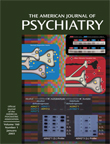To the Editor: I agree with Dr. Epstein that relative risk provides a more accurate estimate of the risk of depressive symptoms in cannabis abusers than the odds ratio in the context of the ECA follow-up study. The odds ratio typically provides an unbiased estimate of the relative risk but provides a less biased estimate of risk when the predicted condition is not infrequent
(1). The incidence of any depressive symptoms in the study in question was much higher than expected (31%) and explains the difference between the relative risk and odds ratio.
However, I disagree with Dr. Epstein’s contention that the use of odds ratios in logistic regression analysis was not clearly stated. Throughout the article, seven odds ratios derived by logistic regression analysis were reported. Dr. Epstein’s concern appears to be that the abstract makes “no mention of odds ratios or logistic regression.” This concern underscores the importance of readers actually reading articles, rather than just abstracts, which are abbreviated out of editorial necessity.
I disagree with Dr. Kuo, who states that the risk set defined in my article was not appropriate. The risk set that I defined as consisting of individuals without depression is appropriate for the article, whose a priori hypothesis concerned the incidence of depressive symptoms, which includes suicidal ideation and anhedonia, among others. The alternative risk set proposed by Dr. Kuo, which consists of individuals without prior suicidal ideation, is appropriate for a study examining the incidence of suicidal ideation in general, such as what he referenced (Kuo et al., 2001). However, it is not appropriate for a study more strictly focusing on suicidal ideation only as a symptom of depression. The post hoc analysis in question was intended to clarify an analysis based on an a priori hypothesis regarding the degree to which individuals without depression symptoms later manifested any depression symptoms that included, but were not limited to, suicidal ideation. The proposed use of a risk set in the post hoc analysis other than that used in the a priori analysis would not clarify the risk of a particular depression symptom among those without depression symptoms at baseline (N=849). The proposed alternative risk set of individuals without suicidal ideation at baseline (N=1,708) would include individuals with other depression symptoms at baseline and would confuse rather than clarify the estimation of the incidence of depression symptoms in total or individually.

